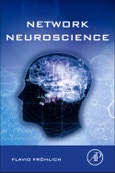Studying brain networks has become a truly interdisciplinary endeavor, attracting students and seasoned researchers alike from a wide variety of academic backgrounds. What has been lacking is an introductory textbook that brings together the different fields and provides a gentle introduction to the major concepts and findings in the emerging field of network neuroscience. Network Neuroscience is a one-stop-shop that is of equal use to the neurobiologist, who is interested in understanding the quantitative methods employed in network neuroscience, and to the physicist or engineer, who is interested in neuroscience applications of mathematical and engineering tools. The book spans 27 chapters that cover everything from individual cells all the way to complex network disorders such as depression and autism spectrum disorders. An additional 12 toolboxes provide the necessary background for making network neuroscience accessible independent of the reader's background.
Dr. Flavio Frohlich wrote this book based on his experience of mentoring dozens of trainees in the Frohlich Lab, from undergraduate students to senior researchers. The Frohlich lab pursues a unique and integrated vision that combines computer simulations, animal model studies, human studies, and clinical trials with the goal of developing novel brain stimulation treatments for psychiatric disorders. The book is based on a course he teaches at UNC that has attracted trainees from many different departments, including neuroscience, biomedical engineering, psychology, cell biology, physiology, neurology, and psychiatry. Dr. Frohlich has consistently received rave reviews for his teaching. With this book he hopes to make his integrated view of neuroscience available to trainees and researchers on a global scale. His goal is to make the book the training manual for the next generation of (network) neuroscientists, who will be fusing biology, engineering, and medicine to unravel the big questions about the brain and to revolutionize psychiatry and neurology.
Table of Contents
NEURONS, SYNAPSES, AND CIRCUITS 1. Membrane Voltage 2. Dynamics of the Action Potential 3. Synaptic Transmission 4. Synaptic Plasticity 5. Neuromodulators 6. Neuronal Communication Beyond Synapses 7. Microcircuits of the Neocortex 8. Microcircuits of the Hippocampus
MEASURING, PERTURBING, AND ANALYZING BRAIN NETWORKS 9. Unit Activity 10. LFP and EEG 11. Optical Measurements and Perturbations 12. Imaging Structural Networks With MRI 13. Imaging Functional Networks With MRI 14. Deep Brain Stimulation 15. Noninvasive Brain Stimulation 16. Network Interactions
CORTICAL OSCILLATIONS 17. Low-Frequency Oscillations 18. Theta Oscillations 19. Alpha Oscillations 20. Beta Oscillations 21. Gamma Oscillations 22. High-Frequency Oscillations
NETWORK DISORDERS 23. Parkinson's Disease 24. Epilepsy 25. Schizophrenia 26. Autism Spectrum Disorders 27. Major Depressive Disorder
TOOLBOXES Toolbox Neurons, Toolbox Animal Models, Toolbox Neurology, Toolbox Psychiatry, Toolbox Matlab, Toolbox Electrical Circuits, Toolbox Differential Equations, Toolbox Dynamical Systems, Toolbox Graph Theory, Toolbox Modeling Neurons, Toolbox Physics of Electric Fields, Toolbox Time and Frequency








